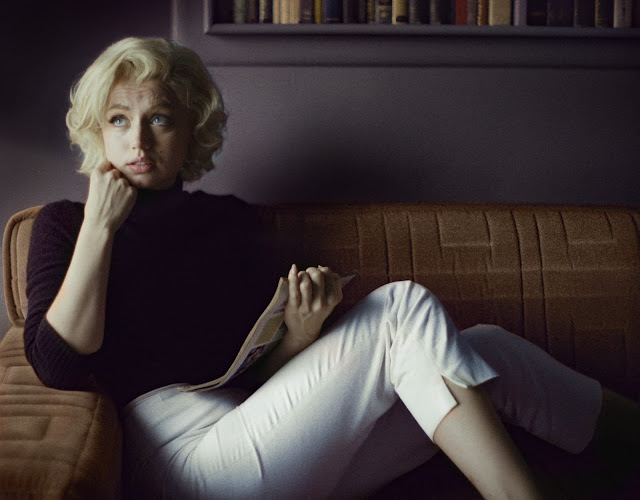Blonde
This year's BLONDE (released on Netflix in September after a short theatrical run) has several issues, but perhaps the most curious is that for such a stream of conscious, surreal approach, things are often presented literally when they should've been abstract. Many have favorably compared writer/director Andrew Dominik's new film to the works of David Lynch, particularly TWIN PEAKS: FIRE WALK WITH ME, which to me is wishful thinking. Though it must be said that Nick Cave and Warren Ellis' score was reminiscent of Angelo Badalamenti in moments. This "girl in trouble" story is a musing on the troubled life of Marilyn Monroe nee Norma Jeane Baker, originally concocted in a novel by Joyce Carol Oates. In both works, attempts at historical accuracy seem not to be the raison d'etre, but rather an indictment of the Hollywood system and general misogyny. In Dominik's film, Marilyn is reduced to a concept, a ball of neuroses, and ultimately a dour highlight reel.
The key figures in Marilyn's life: Joe DiMaggio, Arthur Miller, John F. Kennedy are identified generically, while others are specifically named. Marilyn (Ana De Armas) becomes involved in a menage a trois with celebrity offspring Cass Chaplin (Xavier Samuel) and Eddy Robinson Jr. (Evan Williams) and then moves on to troubled relationships with the aforementioned, respectively played by by Bobby Cannavale ("Ex-Athlete"), Adrien Brody ("The Playwright"), and Caspar Phillipson ("The President"). I can't seem to wrap my mind around just why. Maybe they (these very key people in her life) are just composites as well. This curious de-identification reminded me of the film INSIGNIFICANCE.
BLONDE moves chronologically, from Norma Jeane's childhood in the 1930s to her drug induced passage from this world in the early '60s. A life filled with longing for the father she never met and the children she never had (Marilyn would suffer abortions and a miscarriage). The film wastes little time announcing its tone, its one note point of view. We are always looking at Marilyn rather than getting to really know her. The stages of her life are merely glimpsed, darkly. It's as if Dominik edited out all the joyful moments and assembled a calculated burlesque of despair. This can work in the right hands, but here it becomes wearying.
For every good artistic choice the director makes, there are a few dozen questionable ones. The self-consciously symbolic childhood scenes, with Norma Jeane's house and seemingly all of Hollywood ablaze. The bizarre use of SnorriCam as the Ex-Athlete rushes down a hallway towards Marilyn - ridiculous and showy. A particular POV during an abortion defies justification. A lingering shot on a stop sign as she has second thoughts about the procedure is too obvious. Having the unborn fetus speaking to Marilyn in an audible voice, completely unnecessary. Even showing the unborn child at all was a misstep. Really, Andrew, all we needed was Marilyn's hand over her belly; we would've understood. The nadir has to be the demeaning scene where Marilyn visits the President in his bedroom, forced to fellate him as he speaks with advisors on the telephone and watches EARTH VS. THE FLYING SAUCERS on television. The film approaches some kind of sick parody at this point. All of this feels as if Dominik didn't trust (or give a shit about) his audience.
Ms. De Armas mostly disappears into the role. I was very impressed with her work, even when her Cuban accent occasionally slipped through. She, like her director, decidedly captures a certain essence, rather than a note for note imitation. I also liked Brody's gentle portrayal.
Much of Chayse Irvin's cinematography is impressive, but inexplicably frequently shifts from color to monochrome (and different frame rates and aspect ratios) too often. A moment when the Playwright steps outside into New York City has a certain color palate that is as period accurate as I've seen attempted in any contemporary movie. I kinda wish the entire film was shot that way.
Many have accused BLONDE, puzzlingly given an NC-17 rating, of being the same sort of exploitation to which the actress was subjected in real life. Maybe worse. Sensitive viewers object to Armas' frequent nudity, seen as objectifying rather than natural. Similar charges were leveled at Lynch with Isabella Rossellini in BLUE VELVET. There are valid points for both sides of this argument, though I feel the literal stripping away of the artifice of who was Marilyn Monroe is entirely earned and appropriate. The far bigger sin is that we just don't get a better delve into her psyche. As to who Norma Jeane really was, surely a woman of greater complexity than presented here.




Comments